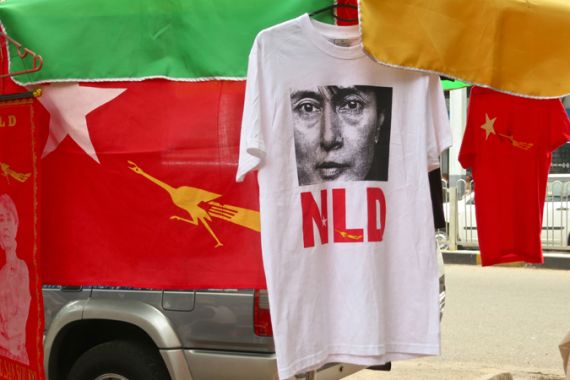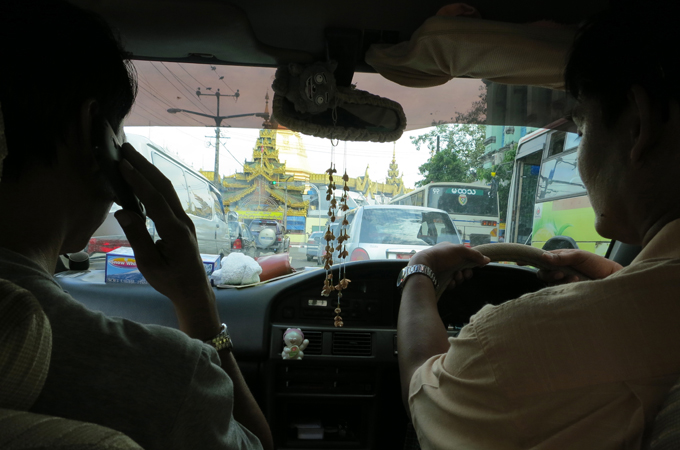Myanmar’s taxi service with a twist
A taxi company run by former political prisoners is making the most of the country’s ongoing transformation.

Yangon, Myanmar – Yangon’s downtown streets are a tangle of buses, cars, bicycles and pedestrians all vying for space.
As traffic inches forward in the oppressive heat, it can be easy for tempers to flare. But there is one group of drivers here who have more patience than others.
The Golden Harp Taxi Service is the brainchild of three former political prisoners – Talky, Bobo and Shell – who have collectively spent more than 30 years in Myanmar’s jails. Political activists born out of the 1988 pro-democracy uprising, until recently their lives were defined by the struggle against the country’s military rulers.
But when the new semi-civilian government came to power last year, the three men found themselves out of jail and thrown back into a society undergoing a dramatic transformation.
“When we were released, we didn’t have any jobs,” says Talky, 45, who was the first to regain his freedom. “Between 1988 and 2010, I was in and out of prison and I didn’t have any plans to do business. I was just interested in doing politics. In the past all I did was politics, and I didn’t have any capital to do business.”
Talky was released in 2010, just as rumours of the reforms began to circulate. He tried to get a regular job, but few employers would take the risk of hiring a political dissident.
Then, after he had the chance to drive around some overseas visitors for a few days, he realised there was one occupation where his activist background wouldn’t matter. He borrowed the $600 needed to put down a deposit on renting a car, and started hauling passengers around Yangon’s heat-weary streets.
He called it the Golden Harp Taxi Service, after a miniature instrument he gave to his first customers.
His friends and former prison-mates, Shell and Bobo, joined him soon after. “I have a family, so I need to do some business to look after them,” says Shell, 43, who spent a total of 14 years behind bars. “And besides, you need money to do political activism.”
When Shell was released in January this year, one of the first things he did was marry his long-term girlfriend. He’d weathered some tough years in jail, suffering the breakdown of his first marriage and estrangement from his only son. According to his new wife, he sometimes get depressed because his son doesn’t recognise him.
Roadblocks to reintegrating
Since the start of 2011, more than 800 political prisoners have been released, according to Thailand-based group Assistance Association for Political Prisoners (AAPP).
An estimated 10,000 Myanmarese spent time in jail during the military’s reign. Since getting out, some have jumped back into politics – there are even members of parliament who are ex-inmates. But many others are just quietly trying to get by. Problems reintegrating into Myanmar’s transitioning society are common.
“To say that a person is a former political prisoner from Burma is nearly synonymous with saying that the individual is a torture survivor,” says Bo Kyi, joint-secretary of the AAPP.
 |
| The taxi company’s main objective is to help other former political prisoners [Elise Potaka/Al Jazeera] |
He adds that, as well as mental and physical health problems, the former prisoners face difficulties finding employment. The reformist government continues to maintain restrictions on ex-inmates, limiting the jobs they can apply for and making it difficult for them to obtain passports. Many lack the skills needed to enter the country’s emerging marketplace, and there have been reports of universities refusing to enroll ex-prisoners.
And despite the country’s move towards openness, there are still reasons to be concerned. Bobo, 42, of the Golden Harp Taxi Service, points out that there are still several hundred political prisoners locked up in the country’s jails.
Since January, there have also been around 200 new politically motivated arrests, according to the AAPP. “We’re moving towards a democratic system, but in a democracy there are no political prisoners,” Bobo says. “If there are still political prisoners, then it’s not a real democracy.”
Bo Kyi of the AAPP believes there needs to be some kind of recognition of past misdeeds in order for the country to really move forward. “The first step is treating former political prisoners with the dignity they deserve.”
And while the government is still a long way from taking this step, the Golden Harp drivers are taking matters into their own hands. Their service has now a fleet of four taxis. Far from being just a money-making venture, the taxi company’s main objective is to help other former political prisoners get back on their feet.
“Each of us tries to put away at least $20 per month. We use that money for a deposit on a taxi for another former prisoner,” Talky explains. In eight months, they’ve already managed to help one former prison-mate rent a car. “If people do well on the outside, they’ll be automatically included in the political reforms,” Talky says. “I’m interested only in that… in seeing some positive changes in my friends’ lives.”
His colleague, Shell, uses stronger words to describe the bond that has formed between those who have done hard time for their political beliefs: “We came from hell together, we’ll stand to the death together; we former prisoners are closer than family.”